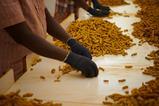Climate change is top of the agenda for businesses and consumers alike, driving food ingredients companies to take action to improve their sustainability impact. Here we explore the strategies ofi is implementing, and the learnings we can take from their progress.
Retailers, food manufacturers, brands and suppliers are facing increasing pressure to deliver on sustainability targets.
And this pressure is increasing as growing awareness and concern about the environment from consumers is driving their purchase habits.
According to a 2024 report by Mintel one in five 16-to 34-year-olds report choosing sustainable products for all the food and drink they buy. While almost a quarter (23%) of UK shoppers list buying more sustainable products amongst the top three changes they expect to make to food and drink shopping once the cost-of-living crisis eases.
With concerns about climate change continuing to hit the top of the agenda, food and drink companies are taking decisive action to improve their sustainability credentials.
Here we explore how global food ingredients supplier ofi (Olam Food Ingredients) is spearheading its own sustainability drive across its raw materials and ingredient platforms globally (cocoa, coffee, dairy, nuts, and spices), sharing the key takeaways that we can learn from ofi’s progress to date.
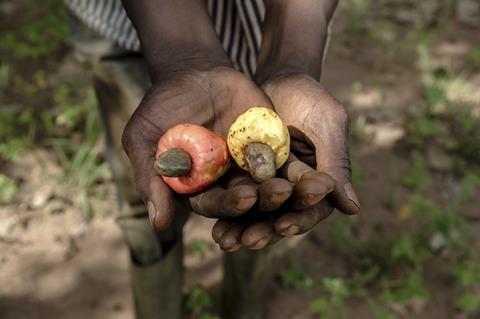
Strategising for the future
Global food systems account for 31% of human-made greenhouse gas emissions, according to the United Nations’ Food and Agriculture Organization. So, on top of changing consumer needs, businesses have a wider responsibility to the planet and people.
ofi has recently revealed its new sustainability strategy – ‘Choices for Change’ with ambitious 2030 targets. Its social and environmental targets apply to its operations spanning 50 countries and focus on specific long-term impacts across four critical pillars: Prosperous Farmers, Thriving Communities, Climate Action, and Regenerating the Living World.
The central tenet of ofi’s sustainability strategy is to offer its customers and partners the traceability, insights and choices, to drive change. An approach taken by ofi, it’s also a crucial strategy to ensure the long-term security of supply for its own ingredients and products.
Every target in this strategy aims to deliver on key customer needs, including enhanced livelihood support to one million farmers, and cutting Scope 3 emissions, the indirect emissions that occur in the value chain, by 30% by 2030.
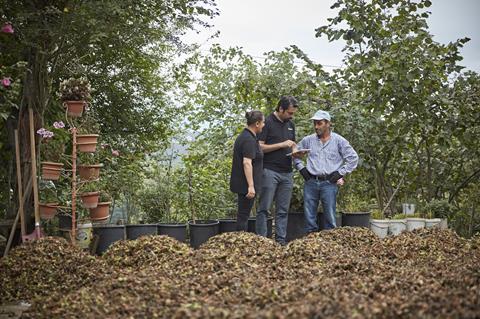
Taking a category focus
One area that has been a major focus is ofi’s nuts portfolio and in particular cashews, hazelnuts and almonds. ofi has set dedicated targets, aligned with the UN Sustainable Development Goals, to scale up its impact on the most pressing issues in these supply chains.
Best practice in the sector, as per ofi’s ambition, is working with partners to improve farmer profitability, protect the rights of children and workers, empower women, and promote regenerative agriculture.
“From our on-the-ground presence and experience running sustainability programs, we are acutely aware of how much we can transform the lives of farming households by supporting farmer incomes and helping other members of the community thrive through tailored outreach like improving health and nutrition, entrepreneurial training for women and youth, and improving access to education,” highlights Burcu Turkay, Global Head of Sustainability for Nuts at ofi.
“Our programs and partnerships span hundreds of farming communities across our products and origins. We rely on engagement from our customers, industry partners and local Government bodies to make change happen at the pace and scale that’s required,” Turkay adds.
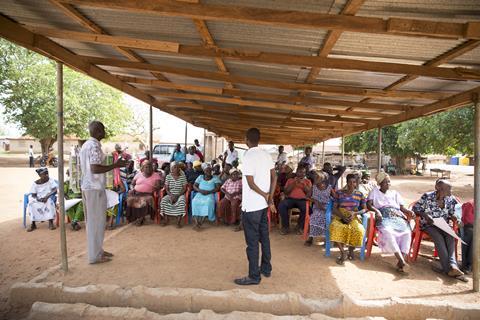
ofi sources its cashews from Asia and Africa, including Côte d’Ivoire, Nigeria, Ghana, Burkina Faso and Vietnam. For over a decade, ofi’s cashew teams have invested in modern machinery to mechanise and expedite local processing, with the creation of over 3,000 direct jobs – more than 70% of which are held by women – at its four private processing facilities [ofi].
The majority of farmers are smallholders and their main source of income comes from Cashews, with the price they are paid for their crop driven by the competitive international market. In Nigeria for example, over 24% of Cashew farmers live below the poverty line.
“We are working with farmers to improve their yields and the quality of their crops,” Turkay says.
“Their needs can vary significantly, from farmers with very small plots of land who need support and loans to diversify their income, to those able to invest for themselves but need upskilling to optimise productivity.”
A comprehensive sustainability approach
A sustainable approach includes a dedication to support the communities behind supply chains.
In Côte d’Ivoire, one in five children experience stunted growth and development, and ofi have set up and run a health screening program with the National Nutrition Programme since 2019.
In 2023, they screened over 14,000 children in Cashew communities using the Infant Malnutrition System Alert smartphone-based application, developed by ofi sustainability analyst Dr Stephanie Konan PhD, with over 390 moderate and acute cases identified and referred to healthcare facilities. As well as doing good for consumers, it’s important the nuts ofi source for its customers are also good for the people and communities that produce them.
Safeguarding children’s and human rights are of particular focus in Turkey, considering Hazelnut sourcing. The workforce here predominantly consists of seasonal migrant workers who are drawn to the farms with their families for the harvest.
Workers on farms receive training on their rights from the company’s own social workers who also set up Summer Schools to provide safe spaces for the children to play and learn, helping reduce the risk of them working in the orchards with their parents and older siblings.

Climate and regeneration
California, a region prone to drought, counts for 80% of the Almond supply chain, making climate and regeneration key considerations for ofi’s Almond Trail sustainability strategy.
Its agronomists focus on smart irrigation techniques to optimise water use and nature-friendly farming practices, known as regenerative agriculture.
Partnerships make a significant impact in this space. ofi is working with KIND Snacks on The KIND Almond Acres Initiative, a regenerative agriculture pilot project across 900+ acres of ofi’s almond orchards in California to test a mix of new technologies with best practices from regenerative agriculture. These practices include planting cover crops that bees love, subsurface irrigation, whole orchard recycling, compost and biochar, and off-ground harvesting.
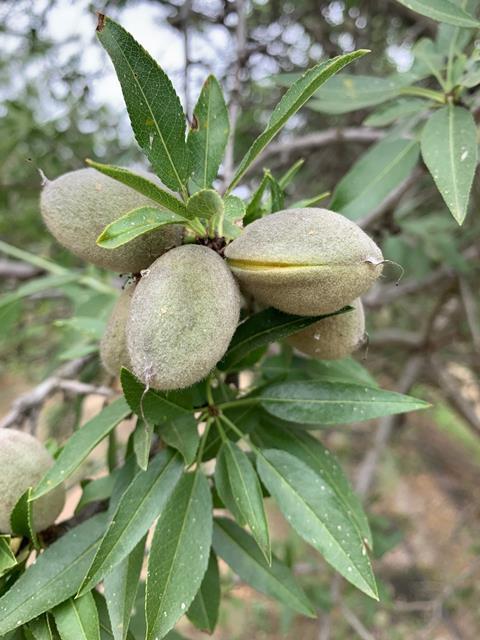
Sourcing and Traceability
While a strong commitment to targeting sustainability within raw materials supply chains is essential, it’s also important that there is transparency for food and drink companies for their own responsible sourcing and traceability – an example being for the consumer ready roasted and seasoned nuts offered by ofi.
“Our extensive farmer programs and innovation capabilities mean we can help customers satisfy the growing appetite for plant-based products and interest in provenance with quality ingredients, from whole nuts and pieces to nut milks and powders, that deliver flavour and functionality,” Turkay confirms.
For example, its Rainforest Alliance certification of its own California almond orchards provides reassurance to food brands and consumers on its responsible sourcing practices.
Reducing carbon emissions in smallholder supply chains
The impact of the company’s commitment to transparency can also have a major impact in supporting Scope 3 emissions.
Its Carbon Sequestration Monitoring Tool combines data from ofi polygon-mapped farms and satellite data with machine learning techniques to build models that calculate the total aboveground biomass - vegetation above the soil, such as stumps, trees, and foliage and how much carbon is present in each plot.
But more importantly this information is easily available to ofi’s customers further up the supply chain via ofi’s sustainability management system AtSource.
AtSource provides access to extensive primary data and a footprinting calculator which allows the customer to see the social impact and carbon emissions for each of their ingredients, so they can then calculate the overall footprint of their product.
“These are driving granular insights into specific supply chains that enable us, together with our customers and partners, to deliver more targeted interventions for real and measurable impact towards our mutual sustainability goals,” she concludes.
Discover how ofi can help you make sustainable choices for your business. Visit ofi.com or contact ofi’s Head of Sales for Nuts, EMENA: umit.ergin@ofi.com.










